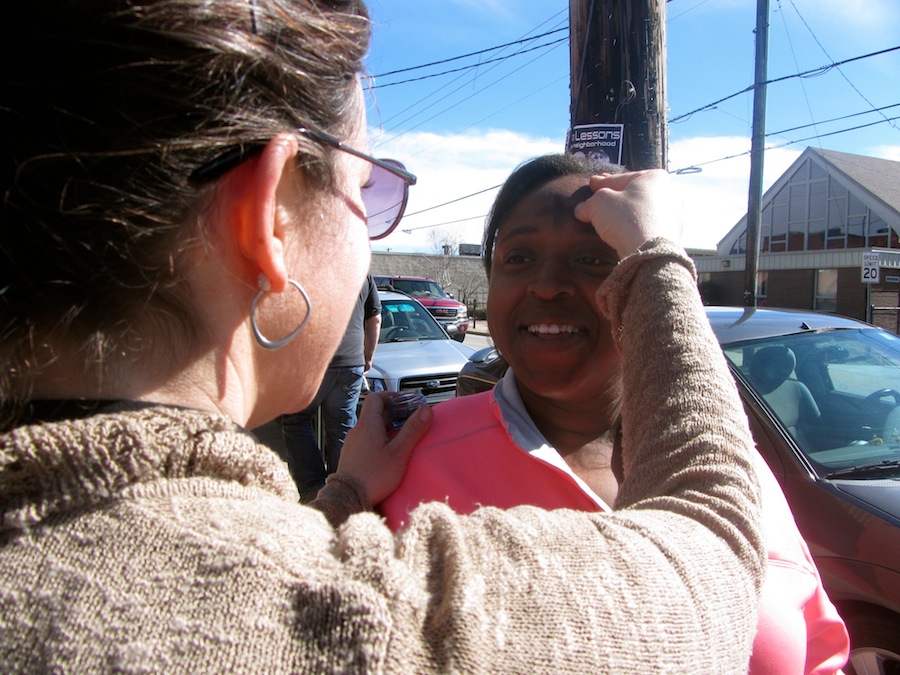Photos by Jordan Foltz
For many in Asheville, the irreverent and colorful Mardi Gras — a holiday celebrating the flesh — is embraced year after year as a holiday open to all. But traditionally, Fat Tuesday is only one side of a coin that is completed by Ash Wednesday — a Christian holiday celebrating the transience and ephemerality of the flesh — ushering in a quiet time of introspection and piety.
At 9 a.m. and 2 p.m., Episcopal priests and clergy convened on the streets of downtown Asheville, West Asheville and at the High Smith Student Union at UNCA to offer passers-by an ashen cross on their forehead, a traditional rite of Ash Wednesday.
“It’s time for us to take [rituals] out, to get out of the building and stop expecting folks to come to us,” said Rev. Canon Milly Morrow from All Souls Cathedral. “People are busy, and so to have a prayer on the street can be a really powerful thing because it’s super intimate … [and] to be doing that in a public way can be really moving.”
Posted on the porch of the West End Bakery in the heart of West Asheville, Rev. Milly was joined by J. Clarkson of All Souls and Kristi Neal, deacon at St. James Episcopal in Black Mountain. After gathering their ounce-size glass jars of ashes and bottles of water, the three spread out along the central portion of Haywood Road to offer people the opportunity for a prayer and ashes.
“Remember you are dust, and to dust you will return,” whispered Rev. Milly to participants as she brushed two ashen streaks across their foreheads.

“Throughout the scripture, ashes are a symbol of humility,” said Milly, “We can bring to the ritual of Ash Wednesday the notion of emptying and humbling oneself in order to be filled again with the grace that is rebirth.”
“[The ashes] are a reminder of our mortality,” said Neal, “But it’s also a real sense of hope that we’re acknowledging our mortality, but we are still alive and there’s work for us to do, and this is a time for us to focus on the intentions behind our work and what is motivating us.”
“For me, this being a period of introspection is what is most relevant,” said J. Clarkson. “Our culture kind of fetishizes being busy. Everybody proves how important they are by how full their calendar is or how many things they have on their to do list. And so lent and this ritual with ashes is a reminder to check back in with nonproductivity and focusing not on what you are doing but why you are doing what you are doing.”
While some may expect clergy in the street to signify an active proselytizing mission, the energy that these groups emanated was peaceful, inviting, and fun — an engaged and street-wise side of the church that Clarkson says he is excited to see more of in the coming years:
“We often talk about parishes and churches synonymously, but the idea of a parish is a community — a geographical area — and so when you talk about bringing these rituals outside of the church building, it puts that building in it’s true context as one which serves a given community. There are all sorts of things, particularly in the hispanic tradition — around say the Virgin of Guadalupe or the Posadas at Christmas time — which are very public celebrations … so to bring those into a more Anglo context is pretty exciting.”




Before you comment
The comments section is here to provide a platform for civil dialogue on the issues we face together as a local community. Xpress is committed to offering this platform for all voices, but when the tone of the discussion gets nasty or strays off topic, we believe many people choose not to participate. Xpress editors are determined to moderate comments to ensure a constructive interchange is maintained. All comments judged not to be in keeping with the spirit of civil discourse will be removed and repeat violators will be banned. See here for our terms of service. Thank you for being part of this effort to promote respectful discussion.